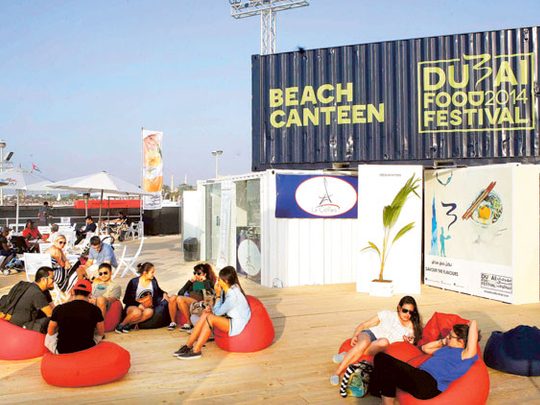
Dubai keeps adding innovative new events to its calendar, and this year has been no different. First the ‘Tour of Dubai’ got the population all excited about competitive cycling, and it also boosted both cycling activities and business in the city.
This was quickly followed by the Dubai Food Festival which was well publicised and visible everywhere with the citywide involvement of restaurants and stores of all shapes and stripes. Many eateries served up creative new menus and dishes marking the event, while stores had special food offers. This event is sure to grow in the years ahead.
A clever idea during the Festival was the Beach Canteens. These were places where people went as families, enjoyed the superb weather by the sea-side, and also had some good food — including in one place an unusual camel biryani!
One attraction that adds to, or indeed creates, the character of many world cities is street food. Which visitor to New York has not eaten hot dogs or pretzels on Madison Avenue or Broadway, or hot pies in London, or crab cakes in Shanghai?
In Singapore, sumptuous Satay can be found anywhere, as can doner kebab and fried fish in Istanbul. Surprisingly, besides all the local specialties, one of the most popular street foods in Delhi is dim sum, the Chinese staple which has been adapted to Indian tastes.
Gourmets and gourmands spend days exploring street eateries that are often unique, varied, inexpensive and charmingly unorganised.
In some places key streets even get closed to traffic at night, coming alive with a delightful array of culinary creations, each made the more special because it is particular to that shop or often the family which runs it.
Perhaps the operative word here is ‘inexpensive’. Street food proliferates more often than not in stalls or carts without the usual overheads that go in service restaurants.
Of course, we are really focused here on ensuring hygiene levels and food quality, but this is surely a detail that can be organised and controlled, just as it has been in all these world cities.
Global phenomenon
Street food has, in fact, become such a global phenomenon that the first World Street Food Congress was held in Singapore in May last year, and many well-known food experts such as Anthony Bourdain, celebrated American chef; Claus Meyer, founder of the much awarded Noma restaurant in Copenhagen; Johny Chan, top food critic and reviewer on Chinese TV; and Arbind Singh, co-ordinator of the National Association of Street Vendors of India, focused their minds on it.
Street food can really add to the spirit of Dubai. With the range of nationalities that we have here, just imagine what an actual street food market would be like. I can just lick my lips at just the thought.
It is also heartening to see the beginning of some flea markets where people can trawl for bargains on vintage and antique goods, the best known being on weekends at the Safa Park.
Places where people can come together for community events of this nature without cost and without red tape are really becoming common in many major cities.
Some malls are trying to create such weekly markets within their walls, but somehow, it does not have the feeling of a Portobello Road Market in London or El Restro in Madrid, or mercatini della’usato in Venice or indeed the Apliu Street Flea Market in Hong Kong where people go to get real bargains on electronics.
Multi-hued tapestry
Most large cities also have a host of small-scale community activities like book reading groups, cancer, autism, haemophilia or other health support groups, adventure groups, choirs, orchestras, et al. These different strands are part of the multi-hued tapestry that makes a city and many of them do exist in Dubai today.
Other than the excellent initiative of the Dubai Community Theatre in Mall of Emirates, (which is already quite busy, and which is not available free of charge), most of these small non-profit groups have no place to go and usually would have to meet either in homes, or try and get accommodated in some school premises in the evenings.
Our city has now matured enough for us to start thinking about how such needs could be facilitated. It would be a wonderful if some of the larger organisations would create such havens that would be for use of non-profits, on a practically cost-free basis. It would certainly be a worthwhile CSR initiative.
— The writer is CEO of retail consultancy Tridayle Consult FZE.












